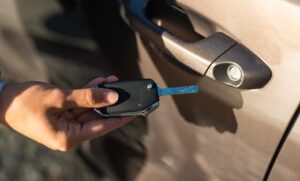You’ve packed your bags, booked your hotel and flight, and prepared your one-week itinerary. Everything seems to be in order. But besides the things you’re taking with you, you should also think about the things you’re leaving behind. How can you be sure all your belongings will be there once you get back home? By securing your home.
Securing the Outside of Your Home
We’ll assume at this point that you’ve taken our advice. You’ve purchased a home security system and signed up for professional monitoring while you’re away. What else can you do to make sure your home is secure while you’re on vacation?
Start with the outside of your home:
Lock everything. Make sure doors and windows are locked, and double- or triple-check everything before you get in the car, including your garage door. You might even disconnect the garage door opener completely to ensure no one can get in. Another good option is to make your garage door “smart” so you can monitor it and control it remotely. Along the same lines, consider installing a smart lock on your front door. This device allows you to monitor who goes into your house remotely and to unlock the door in the case of an emergency. Learn how to install a smart lock.
Remove any spare keys from around the exterior of the house. Collect any spare keys from outside before you leave for vacation. If friends and trusted neighbors will be checking on your house, give them their own keys so you don’t have to leave any lying around for burglars to find. Of course, if you install smart locks, you can give guests passcodes so they can get in without keys. If you prefer to have more control over who comes and goes, however, you can let guests in yourself using an app on your mobile device.
Suspend mail and newspaper delivery. A full mailbox or a pile of newspapers on your front porch tells burglars you’re away. At a minimum, ask a friend or neighbor to come over regularly and take mail and newspapers inside. If you plan to be gone for more than a week, though, you will want to contact the post office and the newspaper and ask them to stop service until your return.
Leave a car in the driveway. Leaving a car parked in the drive is yet another way to suggest you are home. If you need to take yours with you, ask a friend or neighbor to park at your house until you return.

Hire someone to tend your yard. If you plan to be away for a long period of time, ask someone to cut your grass or, if it’s winter, clear snow from your sidewalk. An untidy yard hints that no one is home.
Have someone take out the trash. Trash buildup is yet another sign of an empty house.
Keep schedules regular. While you may want to stop your mail from coming, it’s a good idea to keep other services regular. If, for example, someone cleans your house each week, they should come while you’re gone as well.
Securing the Inside of Your Home
Outer defenses are important, but there are things you can do inside your house to prevent a home invasion while you’re gone:
Use lights effectively. Lights tell everyone you’re around, that you’re up and about inside your house. Use them, then, to simulate your presence. Be judicious, though. Leaving all the lights on in your house all the time will seem strange. One or two left on in common areas like the living room or kitchen will do the job. You can set lights on timers, so they go off and on. A much better option, though, is to incorporate home automation into your lighting routine. Smart bulbs, like those from Philips Hue, let you control lighting with your phone. You can create schedules or utilize “away” modes so the lights turn on and off just as they would if you were home.
Deploy your electronics. Like lights, working televisions, radios, and stereos give the impression someone is at home. In the old days, you left these on when you went out. These days, you can install smart plugs on your devices. These gadgets, which you can purchase for as little as $10, connect devices to outlets. Then, you can set up a schedule for when the devices turn on and off.